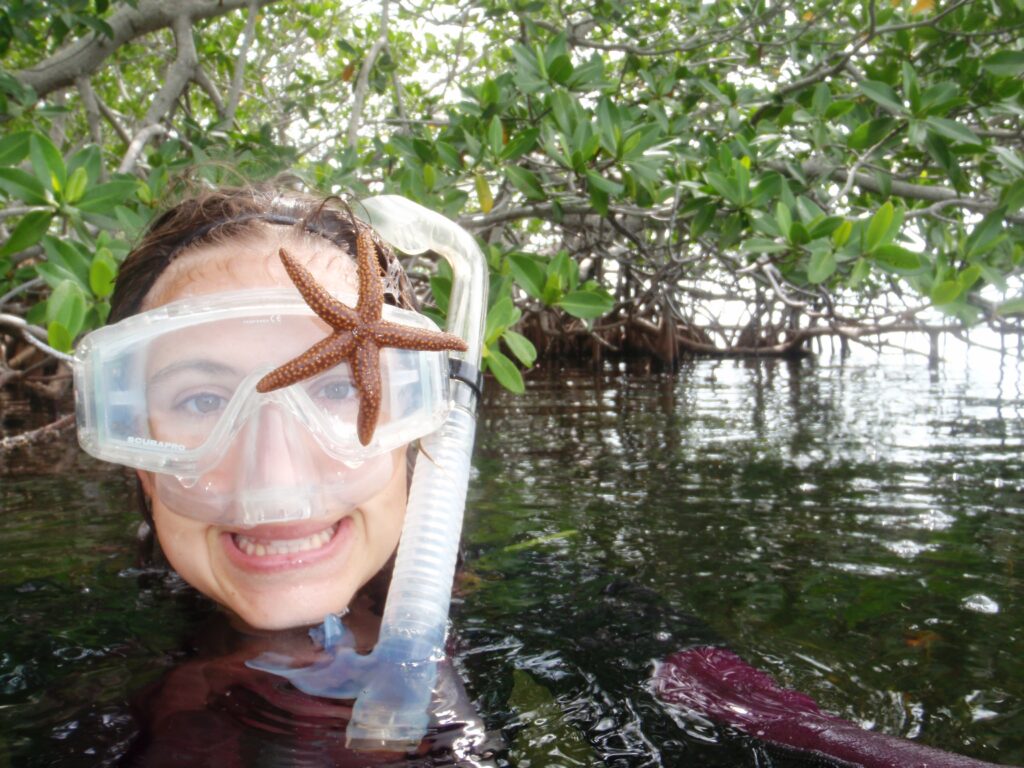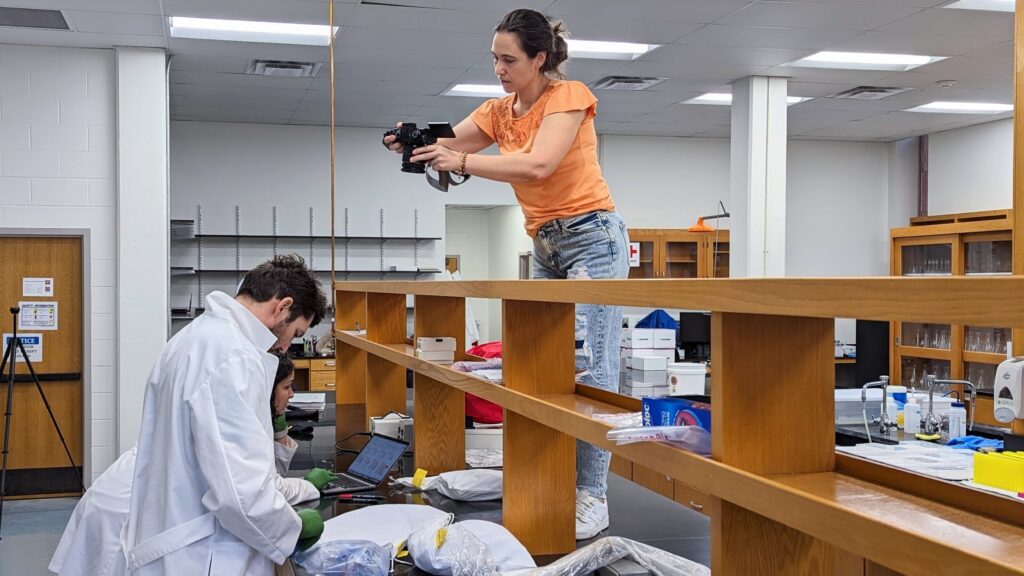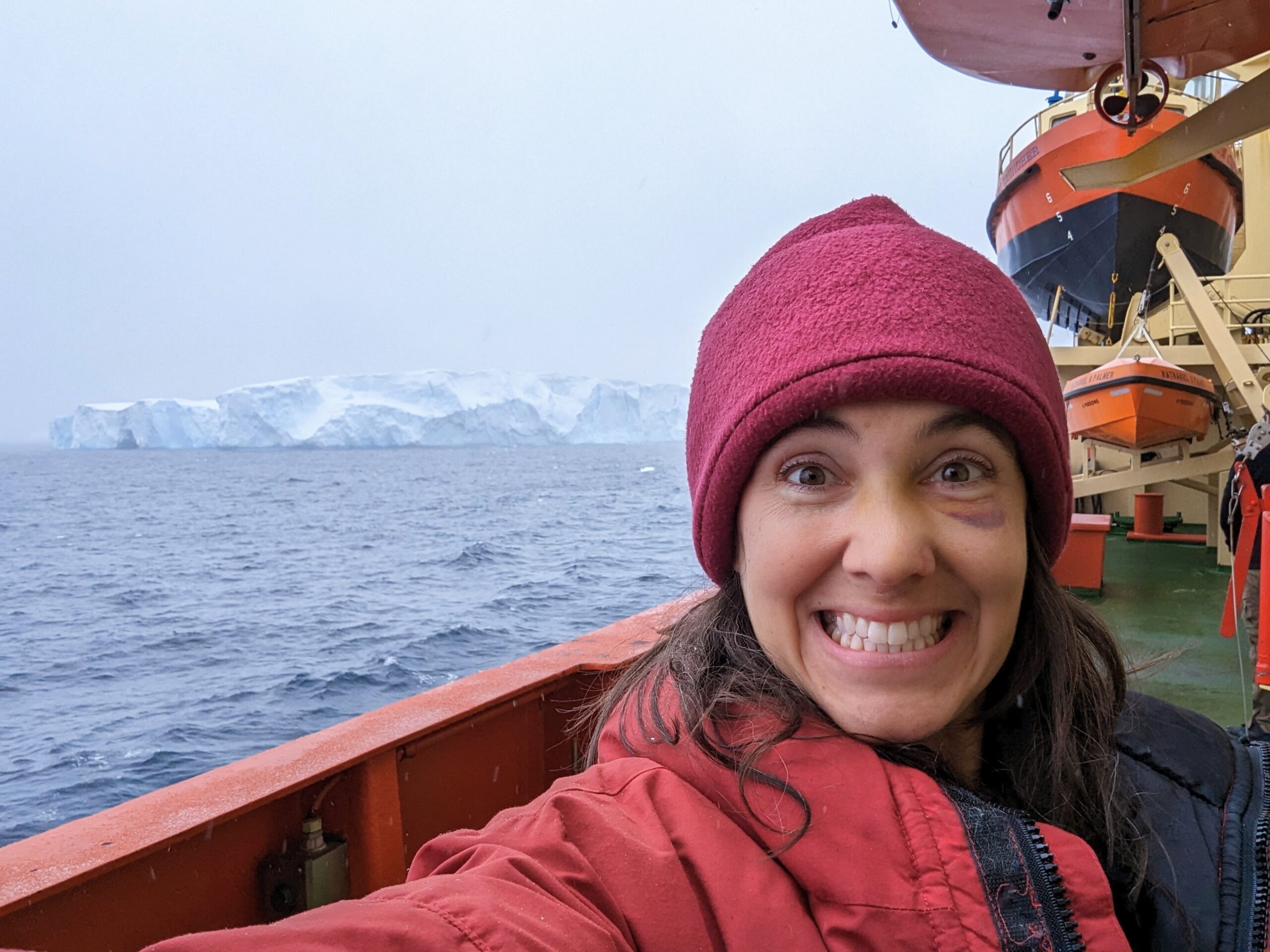Virginia Schutte (PhD ’14) prefers to be uncomfortable—at least intellectually. For her, it’s an indicator of success. It’s how she knows that she’s pushing forward, challenging herself and trying new things.
“I really like momentum as a measure of career success. There’s something about pushing into new spaces and trying new things,” she said. “I feel like what really defines my career is experimentation with how things could be. Not just saying, ‘Oh, that’s the way they are. Let’s keep doing that.’”
Schutte is a science communicator—someone who “makes stuff for the Internet about science.” Every day is different, and she likes it that way.
Last one out (is a future scientist)
Growing up in eastern Kentucky, Schutte fell love with marine science, a passion that lasted into adulthood. “I was the first one in the pool and the last one out,” she said. “It was the whole experience of being surrounded by water, the way that it looks different and the color changes. And when you’re looking down at it, the shift in positioning of things under the water. And the sounds underwater.”
Her parents helped her pursue her interests, as well as shaping them. Her mother worked as a computer programmer, working with decks of punch cards well before there were desktops or laptops. She made sure that Schutte had opportunities to explore her interests—attending a marine biology summer camp, for example. Schutte’s father, a doctor and dean of a medical school, asked her a significant question after she finished a fourth-grade science poster on densities of liquids: “What are you going to ask next?”
They were having breakfast, and she suggested asking how many bites of cereal it takes to get to the end of a bowl.
“He said, ‘That’s a good question,’ and then he took a tiny bite, and then he took a huge bite. And I was like, ‘Oh, you have to control for the bites,’” she said. “This is how I grew up. Looking back on it as a parent, I see them wanting us to be able to direct our own futures.”
Schutte attended the University of North Carolina at Chapel Hill, earning a degree in biology as well as volunteering at a wildlife sanctuary in Australia, studying whales in Mexico, studying fiddler crabs while interning with the Smithsonian Tropical Research Institute, and working on coral in a research lab.

She enrolled in grad school at UGA and worked with Jeb Byers, earning a Ph.D. in 2014. But by then, she had realized that the traditional academic route of conducting research and publishing in academic journals wasn’t the right fit. Instead, she wanted to help people in the general public—especially non-specialists—find and understand scientific information in order to have a quicker impact.
“It all [felt] very scary looking forward,” she said. “But then so natural looking back.”
Now based in Glassboro, New Jersey, she spends her days working as a freelancer with multiple clients—usually three that are highly active, two on the back burner, and another five or so in development.
A typical day might include a meeting for Tini Scientific, an ocean tech startup she co-founded that’s at the early seed stage. She might work on ideas for an ad agency, brainstorming how an imaging company can tell stories about their microscopes and the people that use them. She might deliver one of her workshops to a group of early career scientists or science communicators. She also tries to devote time to creative projects that are just for her—making TikTok videos about being a mom, or researching an idea that could turn into a full-length documentary (which she’s excited about, but not ready to share).
Experimenting in extreme conditions
In spring 2023, Schutte served as outreach and media lead for a deep-sea expedition to East Antarctica led by UGA marine sciences associate professor Holly Bik.
“Every day was the most amazing landscape I’ve ever encountered,” she said. “I feel so privileged to have gotten to know that part of the world.”
While embedded with Bik’s team, Schutte explored the kind of role that an onboard media person might take during such a trip. She experimented with WhatsApp as a microblogging platform, garnering 1,000+ daily followers. She brought thrifted clothes on board and did photo shoots for a piece she plans to pitch about how fast fashion is one of the largest contributors to climate change. Sometimes she was on-camera to explain things from her perspective, and sometimes she gathered content—recording video for TikTok, for example—to share later with partners (e.g., the YouTube channel Minute Earth).

It was a challenging environment to work in, with air so cold it ran down a camera battery in minutes and internet access so limited that only shipboard email and WhatsApp worked.
“Everything felt so new, and there were unforeseen obstacles because of it,” she said. “That always happens with fieldwork—things don’t go the way you want, so you adjust. Nothing is a failure. It’s just always learning.”
This perspective is one thing Schutte shares via SciComm Office Hours, monthly free public calls where people can come to her for career advancement advice. Participants range from beginners to mid-career communicators trying to figure out what’s next. Rather than just placing an FAQ on her website, SciComm Office Hours allows her to give her time in a way that’s more personal and meaningful.
She also gives back to the Odum School, serving as a member of and secretary for the school’s Alumni Board of Members.
“It’s a service that I’m very, very happy to add to my collection of things that I do, plus it’s a great excuse to go back to UGA to stay in touch with people that I really value and like.”
And when she has a few spare moments, Schutte asks herself the questions that propel her forward: What’s new? What am I doing that’s advancing how we think about things and how we move through the world?
“I think there is so much left to be explored in the world,” she said. “And I’m the biggest cheerleader for people who are doing it in ways that feel uncomfortable.”

